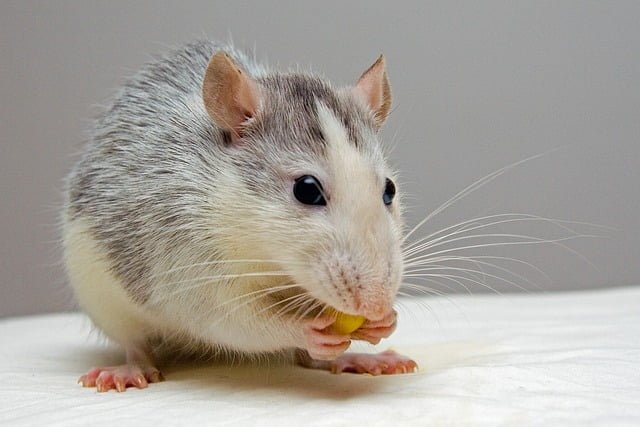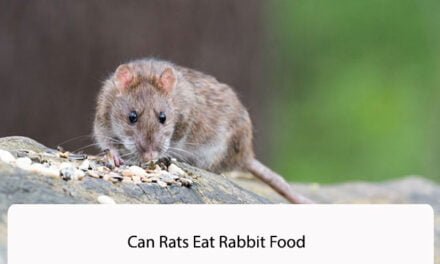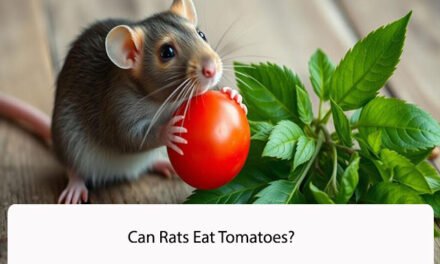Lima beans are a popular legume that is enjoyed by many people around the world. However, if you are a rat owner, you may be wondering whether your furry friend can also enjoy this nutritious food. In this article, we will answer the question: can rats eat lima beans?
Rats are omnivores and can eat a variety of foods, including fruits, vegetables, grains, and proteins. Lima beans are a type of legume that is rich in protein, fiber, and other essential nutrients. While rats can eat lima beans, it is important to feed them in moderation as they can cause digestive issues if consumed in large quantities.
In the next section, we will discuss the nutritional benefits of lima beans for rats and provide some tips on how to safely incorporate them into your rat’s diet.

Understanding Lima Beans
Lima beans, also known as butter beans, are a type of legume that are native to South America. They are a good source of protein, fiber, and various vitamins and minerals. Lima beans are commonly used in soups, stews, and salads, and they can be cooked in a variety of ways, including boiling, steaming, and roasting.
When it comes to rats, lima beans can be a healthy addition to their diet. However, it is important to note that rats should not consume raw lima beans, as they contain a compound called linamarin, which can be toxic in large amounts. Cooking the beans properly will help to break down this compound and make the beans safe for consumption.
Lima beans can be a good source of protein for rats, as well as other essential nutrients like iron, magnesium, and potassium. They are also low in fat and calories, which makes them a healthy addition to a rat’s diet.
Overall, lima beans can be a nutritious and tasty addition to a rat’s diet when cooked properly. As with any new food, it is important to introduce lima beans slowly and in small amounts to ensure that your rat tolerates them well.
Nutritional Value of Lima Beans
Lima beans, also known as butter beans, are a great source of nutrition. They are a good source of protein, fiber, and minerals. Here are some of the key nutritional benefits of lima beans:
Protein
Lima beans are a good source of protein, containing about 15 grams of protein per cup. This is important for maintaining and building muscle mass, as well as for overall health.
Fiber
Lima beans are also a good source of fiber, containing about 13 grams of fiber per cup. This helps to promote healthy digestion and can help to reduce the risk of certain diseases, such as heart disease and diabetes.
Vitamins and Minerals
Lima beans are also a good source of vitamins and minerals. They contain a variety of important nutrients, including:
- Iron: Helps to transport oxygen throughout the body.
- Magnesium: Important for bone health and muscle function.
- Potassium: Helps to regulate blood pressure and maintain fluid balance in the body.
- Zinc: Important for immune system function and wound healing.
- Vitamin B6: Important for brain function and the production of red blood cells.
Overall, lima beans are a nutritious and healthy food that can be a great addition to any diet.
Rats’ Dietary Needs
As rodents, rats have a diverse diet that includes both plant and animal matter. However, rats are not able to digest all types of food, and some foods can even be harmful to their health. In this section, we will discuss the dietary needs of rats and provide some guidelines for feeding them.
Protein
Protein is an essential nutrient for rats, as it helps to maintain their muscle mass and supports the growth of new tissue. Rats require a diet that is high in protein, and this can be provided by feeding them a combination of animal and plant-based foods. Some good sources of protein for rats include:
- Cooked chicken, beef, or fish
- Eggs
- Tofu
- Lentils
- Chickpeas
Carbohydrates
Carbohydrates are an important source of energy for rats, and they should make up a significant portion of their diet. However, not all carbohydrates are created equal, and rats require complex carbohydrates that are high in fiber. Some good sources of carbohydrates for rats include:
- Brown rice
- Oats
- Whole wheat bread
- Sweet potatoes
- Carrots
Fats
Fats are an important part of a rat’s diet, as they provide energy and help to maintain healthy skin and fur. However, rats require a diet that is low in saturated fats and high in unsaturated fats. Some good sources of fats for rats include:
- Flaxseed oil
- Olive oil
- Avocado
- Nuts and seeds
Vitamins and Minerals
Rats also require a variety of vitamins and minerals to maintain their health. Some essential nutrients for rats include:
- Vitamin C
- Vitamin D
- Calcium
- Iron
- Zinc
These nutrients can be provided by feeding rats a varied diet that includes fruits, vegetables, and fortified foods.
In conclusion, rats require a balanced diet that includes a variety of protein, carbohydrates, fats, vitamins, and minerals. By providing rats with a healthy diet, we can help to ensure that they live long and healthy lives.
Can Rats Eat Lima Beans
Lima beans are a type of legume that is commonly found in many households. As a rat owner, you may be wondering if it is safe for your pet rat to consume lima beans. In this section, we will discuss whether or not rats can eat lima beans.
First and foremost, it is important to note that rats are omnivores and can eat a variety of foods. However, not all foods are safe for rats to consume. In the case of lima beans, they are safe for rats to eat in moderation.
Lima beans are a good source of protein, fiber, and other essential nutrients that rats need to maintain good health. However, it is important to note that lima beans should not be a staple food in your rat’s diet. Instead, they should be given as an occasional treat.
It is also important to prepare lima beans correctly before feeding them to your rat. Raw lima beans contain a toxin called linamarin, which can be harmful to rats if consumed in large quantities. Therefore, it is recommended that you cook the lima beans thoroughly before feeding them to your rat.
In conclusion, rats can eat lima beans in moderation as an occasional treat. However, it is important to cook them properly to avoid any potential harm from toxins. As always, it is best to consult with your veterinarian before introducing any new foods to your rat’s diet.
Potential Risks
When feeding lima beans to rats, it is important to be aware of potential risks. While lima beans are generally safe for rats to eat, there are a few things to keep in mind.
High Protein Content
Lima beans are high in protein, which can be beneficial for rats. However, too much protein can be harmful, especially for older rats or rats with kidney problems. It is important to monitor your rat’s protein intake and make sure they are not getting too much.
Anti-Nutrients
Lima beans contain anti-nutrients such as phytic acid and lectins. These compounds can interfere with the absorption of nutrients and cause digestive upset. To reduce the amount of anti-nutrients, it is recommended to soak the beans overnight and cook them thoroughly before feeding them to your rat.
Gas and Bloating
Lima beans can cause gas and bloating in rats, especially if they are not used to eating them. It is important to introduce lima beans slowly and in small amounts to avoid digestive upset.
Overall, lima beans can be a healthy addition to a rat’s diet when fed in moderation and prepared properly. As with any new food, it is important to monitor your rat’s reaction and adjust their diet accordingly.

Safe Consumption for Rats
When it comes to feeding your pet rat, it’s important to make sure that you are providing them with a healthy and balanced diet. One question that rat owners often ask is whether or not rats can eat lima beans. The answer is yes, rats can safely consume lima beans as part of their diet.
Lima beans are a good source of protein, fiber, and other essential nutrients that rats need to stay healthy. However, it’s important to note that lima beans should be fed to rats in moderation. Too many lima beans can cause digestive issues and other health problems for your pet.
When feeding your rat lima beans, it’s important to make sure that they are cooked thoroughly. Raw lima beans contain a toxin called cyanide, which can be harmful to rats and other animals. Cooking the beans will remove the toxin and make them safe for your rat to eat.
In addition, it’s important to introduce new foods to your rat’s diet slowly and in small amounts. This will help to prevent digestive upset and allow your rat’s system to adjust to the new food.
Overall, lima beans can be a healthy and nutritious addition to your rat’s diet when fed in moderation and cooked properly. As with any new food, it’s important to monitor your rat’s reaction and consult with a veterinarian if you have any concerns about their diet.
Alternatives to Lima Beans for Rats
While lima beans can be a healthy snack for rats, not all rats may enjoy them or may have an allergy to them. Fortunately, there are many other vegetables and fruits that rats can eat to supplement their diet.
Here are some alternatives to lima beans that rats may enjoy:
1. Broccoli
Broccoli is a great source of vitamin C and fiber for rats. It can be served raw or cooked. Just make sure to cut it into small pieces to avoid choking hazards.
2. Carrots
Carrots are a crunchy and sweet snack that rats love. They are also a good source of vitamin A and fiber. Make sure to wash and peel them before serving.
3. Apples
Apples are a great source of vitamin C and fiber for rats. They also make a good treat for rats who enjoy sweet snacks. Just make sure to remove the seeds and core before serving.
4. Peas
Peas are a good source of protein and fiber for rats. They can be served fresh or frozen, but make sure to thaw them first if serving frozen peas.
5. Sweet potatoes
Sweet potatoes are a good source of vitamin A and fiber for rats. They can be served cooked or raw, but make sure to cut them into small pieces to avoid choking hazards.
Overall, there are many healthy and tasty alternatives to lima beans that rats can enjoy. It’s important to offer a variety of foods to ensure that rats receive a balanced diet.

Frequently Asked Questions
Are lima beans safe for rats to eat?
Yes, lima beans are generally safe for rats to eat in moderation. However, it is important to note that raw lima beans contain a compound called linamarin, which can be toxic to rats in large amounts. Therefore, it is recommended to cook lima beans before feeding them to your pet rat.
Can rats eat green beans instead of lima beans?
Yes, rats can eat green beans as an alternative to lima beans. Green beans are a good source of fiber, vitamins, and minerals, and are generally safe for rats to eat. However, as with any new food, it is important to introduce green beans gradually and in small amounts to ensure that your rat tolerates them well.
What are some other types of beans that rats can eat?
Rats can eat a variety of beans, including kidney beans, black beans, navy beans, and chickpeas. These beans are a good source of protein, fiber, and other nutrients that are important for your rat’s health. However, it is important to cook these beans before feeding them to your rat, as raw beans contain compounds that can be harmful.
Can rats eat cooked beans or should they only eat raw?
Rats can safely eat cooked beans, but it is important to avoid feeding them raw beans. Raw beans contain compounds that can be toxic to rats, so it is recommended to cook beans thoroughly before feeding them to your pet.
Is it safe for rats to consume oregano?
Yes, oregano is generally safe for rats to consume in small amounts. Oregano has antibacterial properties and can help boost your rat’s immune system. However, it is important to avoid feeding your rat large amounts of oregano, as this can cause digestive upset.
Can rats eat raw meat or should it be cooked first?
It is generally recommended to feed rats cooked meat instead of raw meat. Raw meat can contain harmful bacteria that can cause illness in rats, as well as humans. Therefore, it is important to cook meat thoroughly before feeding it to your rat.




